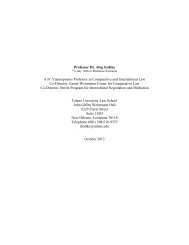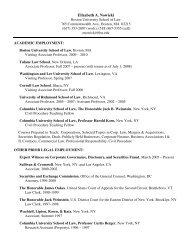Civil Codes of Louisiana - Tulane Law School - Tulane University
Civil Codes of Louisiana - Tulane Law School - Tulane University
Civil Codes of Louisiana - Tulane Law School - Tulane University
You also want an ePaper? Increase the reach of your titles
YUMPU automatically turns print PDFs into web optimized ePapers that Google loves.
Winter 2008 The <strong>Civil</strong> <strong>Codes</strong> <strong>of</strong> <strong>Louisiana</strong> 14<br />
Under the circumstances, courts taking cognizance <strong>of</strong> the fact that the<br />
French text was the original version, and being aware <strong>of</strong> the poor quality<br />
<strong>of</strong> the translation, developed the view that the French text was controlling.<br />
This almost dictated that the <strong>Louisiana</strong> legal pr<strong>of</strong>ession be familiar with<br />
French legislation, jurisprudence, and doctrine. As a result, the French<br />
legal culture enriched the <strong>Louisiana</strong> civilian tradition, especially in the<br />
half century after the 1825 revision.<br />
IV. THE CIVIL CODE OF 1870 34<br />
A. Scope <strong>of</strong> Revision<br />
41 Changes brought about by the <strong>Civil</strong> War, the adoption <strong>of</strong> a new constitution,<br />
and the accumulation <strong>of</strong> civil law legislation that remained outside the 1825 Code,<br />
made revision imperative. Sensitive to this demand, the <strong>Louisiana</strong> legislature<br />
appointed in 1868 a committee to revise the general statutes <strong>of</strong> the state and the<br />
Code <strong>of</strong> Practice. In the same year, the legislature authorized this committee to<br />
select one or more commissioners to revise the <strong>Civil</strong> Code <strong>of</strong> 1825. The<br />
committee charged John Ray <strong>of</strong> the Monroe Bar with this task. Ray employed<br />
three attorneys to assist him, and within a year, submitted his report to the<br />
legislature along with a proposed text. This work was adopted by the legislature<br />
in 1870 under the title <strong>of</strong> “The Revised <strong>Civil</strong> Code <strong>of</strong> the State <strong>of</strong> <strong>Louisiana</strong>.”<br />
42 The <strong>Civil</strong> Code <strong>of</strong> 1870 is substantially the Code <strong>of</strong> 1825. The changes<br />
made relate merely to the elimination <strong>of</strong> provisions concerning slavery, the<br />
incorporation <strong>of</strong> amendments made since 1825, and the integration <strong>of</strong> acts passed<br />
since 1825, which dealt with matters regulated in the Code without <strong>of</strong>ficially<br />
amending it. These changes necessitated renumbering the articles <strong>of</strong> the Code,<br />
but they did not affect its structure, underlying theory, or the substance <strong>of</strong> most <strong>of</strong><br />
its provisions.<br />
B. Controlling Text<br />
43 Unlike the 1808 and 1825 <strong>Codes</strong> that had been published in both French and<br />
English, the 1870 Code was published in English only. Argument could thus be<br />
made that the old question concerning the resolution <strong>of</strong> conflicts between the<br />
French and English versions has become moot. Indeed, if the 1870 Code were to<br />
34 From the rich bibliography on the origin, development, and general character <strong>of</strong> <strong>Louisiana</strong>'s<br />
legal system, see, Barham, Methodology <strong>of</strong> the <strong>Civil</strong> <strong>Law</strong> in <strong>Louisiana</strong>, 50 Tul. L. Rev. 474<br />
(1976); Beutel, The Place <strong>of</strong> <strong>Louisiana</strong> Jurisprudence in the Legal Science <strong>of</strong> America, 4 Tul. L.<br />
Rev. 70 (1929); Cross, The Eclecticism in the <strong>Law</strong> <strong>of</strong> <strong>Louisiana</strong>: A Charcoal Sketch <strong>of</strong> the Legal<br />
System <strong>of</strong> that State, 55 Am. L. Rev. 405 (192 1); Dart, The Legal Institutions <strong>of</strong> <strong>Louisiana</strong>, 3 So.<br />
L. Q. 247 (1918); Fabre-Surveyer, The <strong>Civil</strong> <strong>Law</strong> in Quebec and in <strong>Louisiana</strong>, 1 La. L. Rev. 649<br />
(1939); Jolowicz, The <strong>Civil</strong> <strong>Law</strong> in <strong>Louisiana</strong>, 29 Tul. L. Rev. 491 (1955); Tucker, The Code and<br />
the Common <strong>Law</strong> in <strong>Louisiana</strong>, 29 Tul. L. Rev. 739 (1955). On the use <strong>of</strong> the French language,<br />
see, Herold, The French Language and the <strong>Louisiana</strong> <strong>Law</strong>yer, 5 Tul. L. Rev. 169 (193 1); Note, 3<br />
La. L. Rev. 452 (1941).<br />
Vol. 1 CIVIL LAW COMMENTARIES Issue 1





